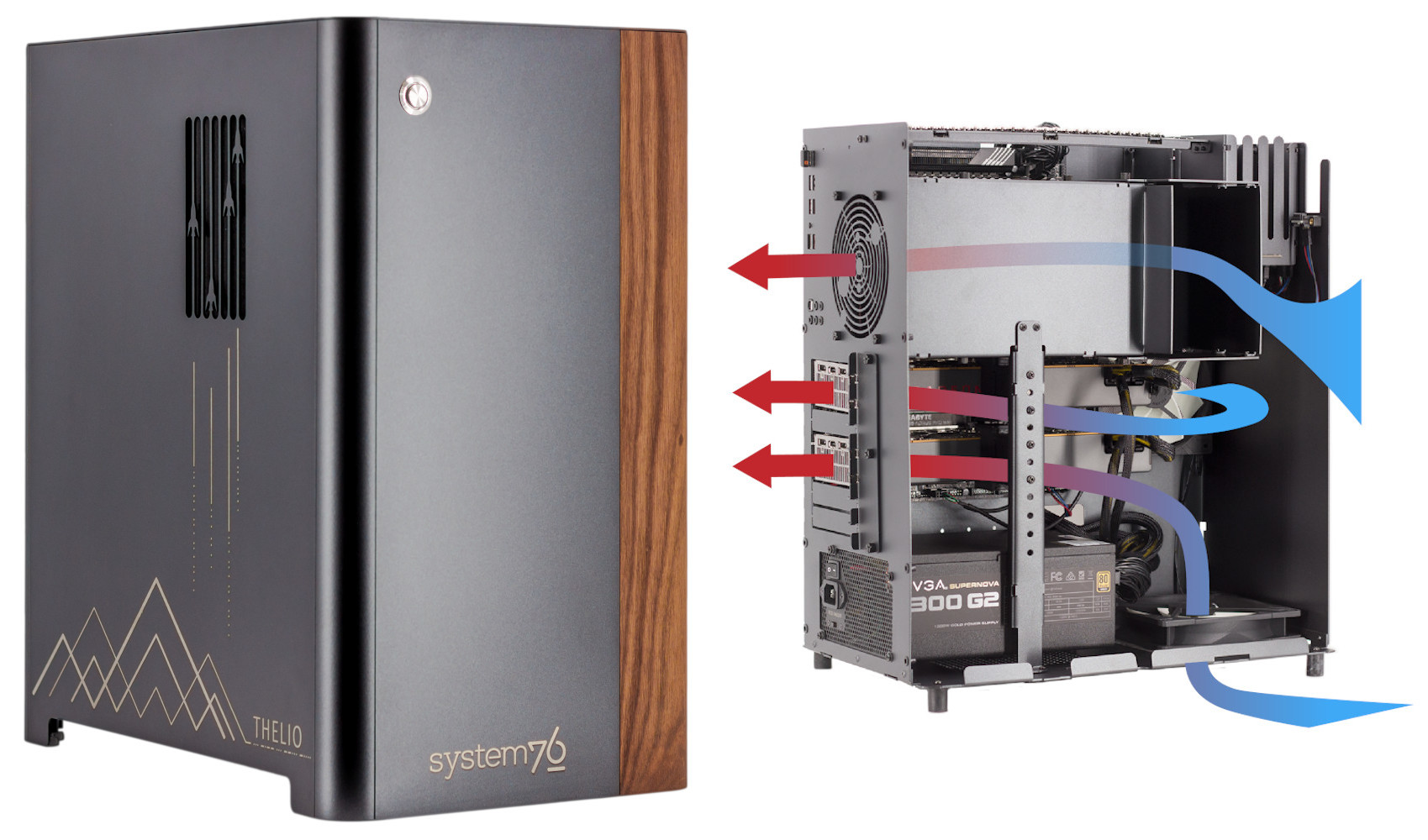Today, AMD officially made the Ryzen Threadripper 3990X available as a seriously high-end desktop processor. Along with that, System76 jumped in right away to give it as an option on their powerful Thelio Major.
Coming with a huge amount of cores, the Threadripper 3990X certainly isn't cheap in the region of around $3,990/£3,696. For that you get a lot of everything though with 64 cores, 128 threads, PCIe 4.0 support, 32MB L2 cache with a base clock of 2.9GHz up to 4.3GHz boost. It's a monster. For gaming, quite likely serious overkill but if you play games and do plenty of content creation, compiling software and things like that all those cores will obviously come in handy. Nothing like playing a game while all your work is going on in the background eh? Find out more here.
If you're after a Linux system with it right away, Linux-focused hardware vendor System76 are coming in hot with the Thelio Major now having the option to configure it with a 3990X. System76 said they spent a lot of time on the internals to accommodate such a powerful CPU. From the press release that was sent over:
Optimizing for the heat produced by a 280 watt, 64-Core CPU was a significant engineering undertaking. We added a large 5.5" (140mm) duct that pulls cool air in from the side of the system, directs it across the heat sink, and exhaust through the rear. This has the added benefit of physically compartmentalizing GPU and CPU heat sources and the air that's pulled in to cool them.
I have some serious computer envy right now looking over the possible specifications of the Thelio Major. You can become envious too using their special landing page which shows some of the tests you can try on your current CPU. Trying out the circular motion blur test detailed on it, which the 3990X can do in around 44 seconds, my current Intel i7 i7 5960x took almost 3 and a half minutes!
You can see more about the Thelio Major from System76 on their official site.
Anyone planning on actually grabbing one of these 3990X ?
Quoting: speskWow. Pricing is pretty competitive on the System76, all things considered. Would never be able to justify the cost for my use cases, but can't deny the temptation. Love the wood paneling look too :PIs it? I haven't specced out a PC in probably over a year now, but I thought those hard drive prices were high, even for the non-NVME ones.
Anyone planning on actually grabbing one of these 3990X ?
But the wood sure does look nice. I've seen some DIY wood PC cases that just looked horrible. This is neat and clean and tasteful.
I'd really love to know what heat sink they're using. I figured one of these beasts would only benefit from liquid cooling. What's the mobo? How well are the VRMs cooled? So much intrigue.
So that thing has 64 Cores physical (128 logical).. How many are used by a game? Not a lot, my 8 cores (+HT) have never been fully used by any game that I know/played. They're are nice for compiling, ray-tracing, video encoding, number crunching though.. And that's exactly the use case of many cores (and even more so for many CPUs); and that's also what is presented in their benchmarks all along. None of them is about gaming.
So as games tend to use very few cores (due to limitations in algorithms, hardware access, etc.) the single core performance is very important us (we're here for gaming, right?). Let's have a look what that might be (couldn't check my own CPU; tried to install the blender benchmark, but the download stalls somewhere in the middle :( ) :
AMD 3990X: 64/128 (physical/logical) cores:
44s real -> 2816s / 5632s CPU
Liam (i7 5960x): 8/16 cores
210s real -> 1680s / 3360s CPU
Ergo: the single core performance of the i7 5960x is about two thirds higher (5632 / 3360 = 1,6762) than that of the AMD 3990X. (Well, that's when assuming the problem & algorithm & parallelization scale linearly of course!)
Does it look less impressive now? Well, it depends. Do you want to setup a pure build server, render farm, number cruncher or something similar? That thing might be something for you. Do you want to have a pure gaming machine? Well, expect your performance to drop a bit as most games can't make use of so many cores. Do you need a hybrid, running games while having some heavy jobs in the background (as Liam mentioned as a use case) and not expecting best performance - compared to other current high end CPUs - in the game? This might be something you might consider.
So in the end it's like always, benchmarks - especially in press announcements - always sound nice, but you still have to check if they apply to your use case and find a benchmark which checks your usage to make a proper decision.
Hope that helps to relieve the sadness of those who too quickly wished to have that thing...
I'd want that case though, but as it seems they're not selling it separately... And it's lacking some space for all my hard drives anyway...
How many are used by a game? Not a lot, my 8 cores (+HT) have never been fully used by any game that I know/played.Depends on the game. dxvk for example uses a percentage of all available cores for some tasks. So if something is CPU bound and can be parallelized, good games will parallelize it according to available hardware.
Games using a few cores is a thing of the past, before Vulkan was a thing. Single core performance is oversold, it doesn't matter as much as it did in the previous decade.
And you can say goodbye to Intel's high frequency of individual cores, once they'll switch to smaller node process. Physics will dictate such limitation. So get used to what AMD are already doing now, Intel will have no choice but to deal with the same reality.
All that said, I agree that Threadripper is surely an overkill for gaming. Get a recent Ryzen 9 if you want a high end CPU.
Last edited by Shmerl on 9 Feb 2020 at 9:56 pm UTC
Quoting: ShmerlDepends on the game. dxvk for example uses a percentage of all available cores for some tasks. So if something is CPU bound and can be parallelized, good games will parallelize it according to available hardware.As long as it's not using those cores at almost 100% it's just task scheduling and core cycling to reduce heat in each single core. If your system load isn't close to you number of logical cores, it doesn't really use them and you'd be fine with a lot fewer of them.
Quoting: ShmerlGames using a few cores is a thing of the past, before Vulkan was a thing. Single core performance is oversold, it doesn't matter as much as it did in the previous decade.Vulkan allows parallel access to the driver, but actual communication to the GPU is still sequential. So, if you have lots of pre-processing done on the CPU which can be done in many threads, it will help. If not, the performance gain can stall very quickly and adding more cores won't change anything.
Quoting: ShmerlAnd you can say goodbye to Intel's high frequency of individual cores, once they'll switch to smaller node process. Physics will dictate such limitation. So get used to what AMD are already doing now, Intel will have no choice but to deal with the same reality.I'm not trying to belittle AMDs accomplishments, what I wanted to emphasize is that every benchmark has to be taken with a grain of salt. There was no judgement or anything like it intended. Just that you should take a closer look at marketing statements before making a decision to buy.
Quoting: peta77Vulkan allows parallel access to the driver, but actual communication to the GPU is still sequential.Not if you are using different GPU queues. Modern GPUs have more than one, and they should be used in parallel for maximum performance. So real parallelism on the CPU side (through multiple cores) paired with real parallelism on the GPU side (through units that process compute and graphics queues) allow maximizing performance, as long as your code takes advantage of that.
Last edited by Shmerl on 9 Feb 2020 at 10:37 pm UTC










 How to setup OpenMW for modern Morrowind on Linux / SteamOS and Steam Deck
How to setup OpenMW for modern Morrowind on Linux / SteamOS and Steam Deck How to install Hollow Knight: Silksong mods on Linux, SteamOS and Steam Deck
How to install Hollow Knight: Silksong mods on Linux, SteamOS and Steam Deck